The following editorial concerning the Dartmouth senior fellowships, entitled "June's Most Unusual Degrees," was printed in the Boston Transcript June 16:
"To find the newest and most unusual element in the 1930 Commencement season, one must look to Dartmouth College. There five degrees are being granted tomorrow under conditions the most exceptional allowed to any of the thousands and thousands of seniors graduated this June by colleges and universities the country over. We refer to the diplomas which President Hopkins will. confer upon Dartmouth's five so-called "senior fellows," the first of their kind at Hanover and the first anywhere in the United States.
"These five men now being graduated by Dartmouth have spent all of their senior year under the following quite unheard-of conditions: 1. They have paid no tuition fee whatsoever. 2. They have had no regular classes which they were required to attend. 3. They have not been accountable for any other compulsory exercises or assigned task outside of the classroom.
"The question will arise, among those unfamiliar with the terms of the new Dartmouth senior fellowships, "What on earth have they been doing?" The answer is simple, and, in the light of the full record, most praiseworthy. Something more than a year ago, the five men who receive their diplomas tomorrow were chosen from among all the junior class at Dartmouth as students of special promise. One or two of them did not have very high rank in all their subjects, but had shown interest and ability of a superlative kind in particular fields. What is still more to the point, they were young men whom the president and faculty felt certain could be trusted, if given entirely free command of their time, to make valuable use of it for some self-chosen end. Men, in short, who could see for themselves a field of learning and culture which strongly attracted them, and set to work for some concentrated result, and not merely for the sake of passing a certain number of required courses.
"If President Hopkins had any doubt of the success of this very unusual experiment in American undergraduate life, that doubt, we understand, has long since been quieted. Space does not here serve for a detailed review of the achievements of the five fellows. It must suffice to report that each of them has carried out a self-appointed program which, making use of the college library and of constant contact with interested professors, has had rich value. One man a resident of Greater Boston and an altogether exceptional student in the classics and in church history has kept himself and certain of his faculty consultants so busy that it has been laughingly said at Hanover that "with one more man like him as a senior fellow, the classics department would have to be doubled." Another very able youth in the group is the son of John D. Rockefeller, Jr. With special acumen he chose for his senior year activities of a kind which he thought would aid the breadth of his understanding and cultural equipment for maintaining the higher side of the heavy responsibilities which one of his family is certain to be called on to bear in these United States.
"Of course it is not at all the intent of Dr. Hopkins to remodel college life in conformity with the exceptional privileges given these five young men. On the contrary, Dartmouth recognizes that the structure of formal undergraduate requirements in general must not in general be changed, and that the men selected for these senior fellowships must be very wisely chosen. But it is the president's view that the whole student body at Dartmouth would profit by having held up before them these special examples of the human will and of high-minded scholarship functioning at their best—namely, under that self-imposed discipline which the mature mind, having a real interest in learning, can always be trusted to adopt. We fully share Dr. Hopkins' anticipation, and are glad to know that another group of "senior fellows" has been elected for 1930-31. There is no more striking and potentially valuable innovation under way in any American college today."
 View Full Issue
View Full Issue
More From This Issue
-
 Article
ArticleMy Love for Languages
August 1930 By Dr. James A.Spalding '66 -
 Class Notes
Class NotesCLASS OF 1929
August 1930 By Frederick W. Andres -
 Lettter from the Editor
Lettter from the EditorEditorial Comment
August 1930 -
 Article
ArticleMidsummer Musings
August 1930 By Phil Sherman -
 Article
ArticleDebating at Dartmouth
August 1930 By E. V. Simrell, Faculty Advisor -
 Article
ArticleAgain Among the Hills
August 1930 By Arthur Dewing
Article
-
 Article
ArticlePRESIDENT'S ADDRESS EVOKES NATION-WIDE COMMENT
November, 1922 -
 Article
ArticleDr. Ruggles Honored
March 1939 -
 Article
ArticleShortages Met
January 1947 -
 Article
ArticleLawsuit update
NOVEMBER • 1987 -
 Article
ArticleA DARTMOUTH MAN AT THE FRONT
December, 1915 By Alexander John Marshall Tuck, '14 -
 Article
ArticleFaculty
APRIL 1971 By WILLIAM R. MEYER

